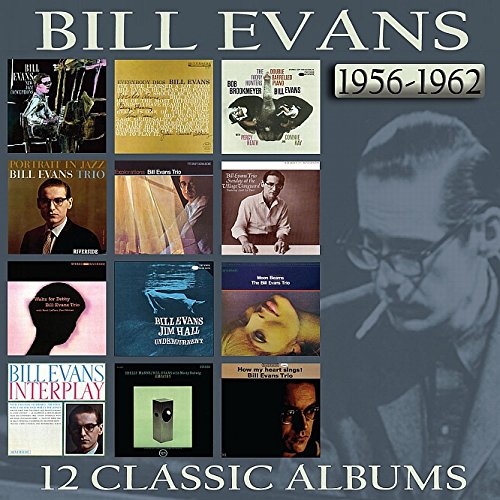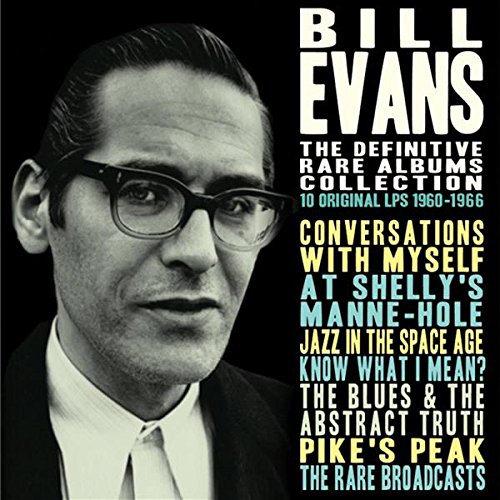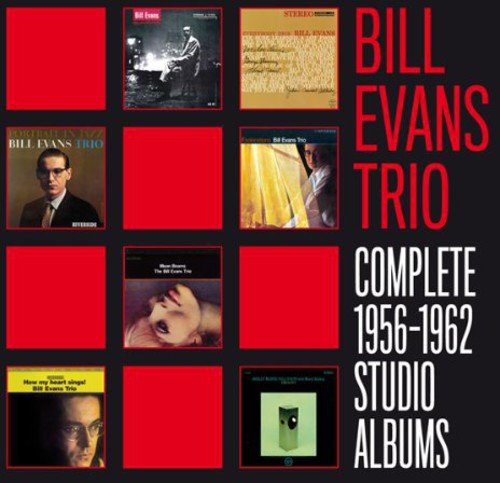Background
He was born in Plainfield, New Jersey, the son of Harry F. Evans and Mary Soroka. As a boy Evans played the flute, violin, and piano.



(BILL EVANS - 1956-1962: 12 CLASSIC ALBUMS - 6 CD SET)
BILL EVANS - 1956-1962: 12 CLASSIC ALBUMS - 6 CD SET
https://www.amazon.com/12-Classic-Albums-1956-1962-6CD/dp/B00MR9HO9C?SubscriptionId=AKIAJRRWTH346WSPOAFQ&tag=prabook-20&linkCode=sp1&camp=2025&creative=165953&creativeASIN=B00MR9HO9C

(Hugely acclaimed for his remarkable grasp of melody, harm...)
Hugely acclaimed for his remarkable grasp of melody, harmony and interpretation, Bill Evans has earned his reputation as one of the most influential pianists and composers in jazz history. Classically trained from an early age, Evans initially made a name for himself working with other famous figures of the jazz genre, including George Russell, Cannonball Adderley, Chet Baker and Miles Davis, and his playing was a key feature on the latter s legendary Kind Of Blue (Columbia, 1959). By the early 1960s, Bill Evans began focussing on leading his own groups, primarily trios. Over the rest of his career, he put out a staggering body of work, including the classic albums Sunday At The Village Vanguard and Waltz For Debby (both Riverside, 1961). He received 31 Grammy nominations during his lifetime, taking away nine awards in total, and earned himself a place in the Down Beat Jazz Hall Of Fame. However, despite all his achievements, there are still many criminally overlooked albums on which Evans playing rivals some of his best known work; the aim of this collection is to bring back into focus some of these records, and to provide the listener a chance to review just what fine recordings are often underappreciated. Despite his premature passing on 15th September 1980, after years of substance abuse, Bill Evans is as highly regarded today as ever he was and remains an icon of jazz for millions. This four disc set, containing over five hours of extraordinary music, collates some of the lesser-known works by this master musician, which fans old and new alike can now gain access to.
https://www.amazon.com/Definitive-Rare-Albums-Collection-1960-1966/dp/B01MZAIC8P?SubscriptionId=AKIAJRRWTH346WSPOAFQ&tag=prabook-20&linkCode=sp1&camp=2025&creative=165953&creativeASIN=B01MZAIC8P

(EU-only four CD set containing seven albums from the Jazz...)
EU-only four CD set containing seven albums from the Jazz great. Includes Bill Evans' complete trio studio albums released from 1956 to 1962. Included in this set are the full contents of the original LPs NEW JAZZ CONCEPTIONS, EVERYBODY DIGS BILL EVANS, PORTRAIT IN JAZZ, EXPLORATIONS, MOONBEAMS, HOW MY HEART SINGS and EMPATHY.
https://www.amazon.com/Complete-1956-62-Studio-Albums-EVANS/dp/B00KGBV6D8?SubscriptionId=AKIAJRRWTH346WSPOAFQ&tag=prabook-20&linkCode=sp1&camp=2025&creative=165953&creativeASIN=B00KGBV6D8
He was born in Plainfield, New Jersey, the son of Harry F. Evans and Mary Soroka. As a boy Evans played the flute, violin, and piano.
He graduated from North Plainfield High School in 1946 and attended Southeastern Louisiana College, where he graduated in 1950 with a major in piano and a minor in flute.
Evans served in the United States Army from 1951 to 1954. He was stationed in Illinois, where he played the flute in an army band. During his off-duty hours he pursued his interest in jazz, performing as a pianist in nightclubs in Chicago.
In 1955 he returned to the New York City area and did postgraduate work at the Mannes College of Music. He began in earnest his career as a jazz musician, playing piano with such noted jazz artists as Tony Scott and Charles Mingus.
He studied the modal techniques of jazz composer George Russell, and began to incorporate them into his own improvisations and compositions.
His piano solo on Russell's 1957 recording "All About Rosie, " commissioned by the 1957 Brandeis University Festival of the Arts, brought Evans widespread recognition and praise.
The key factor in Evans's development as a musician was his replacement in 1959 of the pianist Red Garland in a sextet led by trumpeter Miles Davis. The ensemble included alto saxophonist "Cannonball" Adderley, tenor saxophonist John Coltrane, bassist Paul Chambers, and drummer Jimmy Cobb. Davis's influence on Evans was profound.
During their brief association, Evans refined the distinctive improvisational and accompaniment style that would place his personal stamp on a whole generation of pianists. The sextet produced the Columbia Records album Kind of Blue (1959), which became the benchmark for modal improvising. Evans's piano playing combined his modal experience with Russell with the innovative modal style that Davis was exploring.
The album represented a pathbreaking shift from improvising over a set of fixed harmonic progressions to the free use of church modes, which dated back to medieval sacred music. After finishing his stint with the Davis group, Evans formed his own trio the same year. Before Evans, the trio was a setting that used the bass and drums as accompaniment to and reinforcement of the solo piano line. With Evans, drums and bass became central to the musical experience.
By the early 1960's, he had forever changed the way trio playing will be evaluated. His classic ensemble included drummer Paul Motian and bassist Scott LaFaro. Much of what is generally considered the essence of Bill Evans's trio playing was produced during this collaboration, including the 1961 Riverside albums Waltz for Debby and Live at Village Vanguard.
This creative outburst of the late 1950's through the early 1960's was cut short by the death of LaFaro in an automobile accident in 1961. It was not until Evans started to work with bassist Chuck Israels a year later that his concept of the unified trio continued to evolve. He recorded the highly acclaimed Verne album Trio '65 with Israels and drummer Larry Bunker. The trio remained Evans's preferred format and he continued to polish his signature style with various ensembles. He also made albums of duets with Jim Hall, Eddie Gomez, and Tony Bennett.
A legendary solo performer, he recorded two albums with Verve, Conversations with Myself (1963) and Further Conversations with Myself (1967), where he improvised against a prerecorded track of his own playing. In 1973, Evans married Nenette Zazzara; they adopted one child. Evans was a prolific composer. His compositions, however, were closely tied to his improvisational style and few became well-known standards performed by other artists.
Despite health difficulties involving stomach ulcer and liver problems and a recurring struggle with drug addiction, Evans appeared in public and recorded regularly until just before his death in New York City.
One of the best ways to study Evans's approach is to look at transcriptions of his improvisatory performances, which are note-for-note renderings of his playing. His style encompassed long, flowing melodic lines with very sparse left-hand accompaniment and then beautiful full reharmonized chords with nonchord tone intervals of half and whole steps.
Evans died in New York City.
Evans's compositions often utilized a few basic formulas or patterns combined into a complex structure over which he then improvised. His innovations have been incorporated into the vocabulary of a succeeding generation of jazz pianists, including Chick Corea, Herbie Hancock, and Keith Jarrett. Evans received five Grammy awards and won the Down Beat critics poll five times, England's Melody Maker award (1968), and Japan's Swing Journal award (1969). Davis paid homage to Evans with the ultimate accolade, remarking that "he played the piano the way it should be played. " Evans's influence on pianists extended beyond the trio setting into the realm of extended improvisations and reharmonization of popular melodies.
(Hugely acclaimed for his remarkable grasp of melody, harm...)
(EU-only four CD set containing seven albums from the Jazz...)
(BILL EVANS - 1956-1962: 12 CLASSIC ALBUMS - 6 CD SET)
Evans never embraced new music movements; he kept his style intact. For example, he lamented watching Davis shift his style towards jazz fusion, and blamed the change on considerations of commerce.
Quotations: Evans commented "I would like to hear more of the consummate melodic master [Davis], but I feel that big business and his record company have had a corrupting influence on his material. The rock and pop thing certainly draws a wider audience. It happens more and more these days, that unqualified people with executive positions try to tell musicians what is good and what is bad music. "
He was a founding member of SLU's Delta Omega Chapter of Phi Mu Alpha Sinfonia.
Quotes from others about the person
Evans' friend Gene Lees described Evans' struggle with drugs as "the longest suicide in history. "
In summer 1963, Evans and his girlfriend Ellaine left their flat in New York and settled in his parents' home in Florida, where, it seems, they quit the habit for some time. Even though never legally married, Bill and Ellaine were in all respects man and wife. At that time, Ellaine meant everything to Bill, and was the only person with whom he felt genuine comfort.
In 1973, while working in Redondo Beach, California, Evans met and fell in love with Nenette Zazzara. In August 1973, Evans married Nenette, and, in 1975, they had a child, Evan. The new family, which also included Evans' stepdaughter Maxine, lived in a large house in Closter, New Jersey. Both remained very close until his death. Nenette and Bill remained married until Bill's death in 1980.
